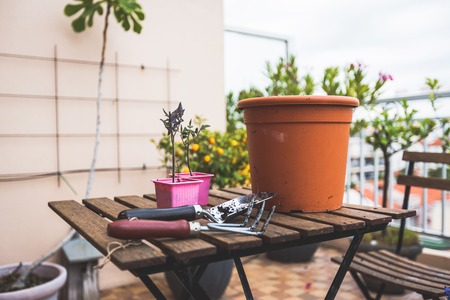Understanding Your Rental Agreement for Outdoor Spaces
Before you start planning your green oasis or outdoor upgrades in your rented flat, it’s vital to first understand what your rental agreement allows when it comes to gardening and outdoor maintenance. In India, rental contracts can differ widely, especially regarding the use of balconies, terraces, or shared gardens. Carefully reviewing your lease is the first step. Look for any specific clauses about making changes to outdoor spaces, including planting, installing pots, or even placing garden furniture. Some landlords may require written permission for any modifications, while others may restrict the use of certain areas altogether.
If you’re unsure, don’t hesitate to have an open conversation with your landlord or housing society. Clarify whether you are allowed to set up potted plants, vertical gardens, or small composting units. Additionally, check who is responsible for the upkeep of common outdoor areas—this might fall under your duties as a tenant or be managed by building maintenance staff. Being clear on these details at the outset will help you avoid misunderstandings and ensure that your gardening efforts align with community norms and legal expectations in Indian flats.
2. Low-Cost Balcony & Terrace Gardening Ideas
For many renters in India, creating a green oasis on a budget is absolutely possible, even in compact flats with limited balcony or terrace space. By using local materials and keeping Indian sunlight conditions in mind, you can start your own low-cost garden that brings nature closer to your home without breaking the bank.
Choosing the Right Plants for Indian Balconies
When selecting plants, consider your regions climate and the direction of sunlight your balcony receives. Opt for hardy varieties that thrive in the Indian environment:
| Sunlight | Recommended Plants |
|---|---|
| Full Sun (South/West Facing) | Tulsi, Hibiscus, Marigold, Money Plant |
| Partial Shade (East/North Facing) | Aloe Vera, Ferns, Snake Plant, Syngonium |
Budget-Friendly Containers & DIY Planters
You don’t need expensive pots to begin gardening. Repurpose old buckets, paint tins, PET bottles, or even traditional earthen pots (matkas) available at local markets. Drill small drainage holes at the bottom and use coconut coir or pebbles for proper water flow.
Container Ideas & Estimated Cost (INR)
| Material | Estimated Cost per Piece |
|---|---|
| Plastic Bottle Planter | Free (Recycled) |
| Earthen Pot (Matka) | 30-80 |
| Old Paint Tin | Free (Recycled) |
| Bamboo Basket | 50-100 |
Soil Mix & Organic Fertilizer Hacks
Create a healthy potting mix by combining red soil (easily found across India), compost from kitchen waste, and cocopeat for moisture retention. For organic fertilizers, use homemade compost or diluted buttermilk as a natural growth booster—these are both eco-friendly and wallet-friendly solutions.
Space-Saving Gardening Tips
- Use vertical racks or wall-mounted shelves to maximize growing area.
- Install hanging planters or railing holders for creepers like money plant or pudina.
- Select dwarf varieties of fruits and vegetables such as cherry tomatoes, chillies, or methi that suit smaller spaces.
- If sunlight is limited, rotate pots regularly for balanced exposure.
Cultural Note: Community Sharing & Bartering Plants
In many Indian neighborhoods and apartment complexes, residents exchange cuttings or seedlings during festivals like Ugadi or Diwali. Participate in these informal plant swaps to diversify your garden affordably while bonding with neighbours.
![]()
3. Water-Smart Gardening Practices
When it comes to rental flats in India, water conservation is not just a preference—it’s a necessity. Most apartment complexes have limited access to water, and many landlords prefer tenants to avoid excessive use of resources. Adopting water-smart gardening methods is both eco-friendly and tenant-friendly. Here are some practical ways to maintain a lush balcony or terrace garden without overstepping rental restrictions or increasing your monthly bills.
Choose Drought-Tolerant Indian Plants
Opt for native and drought-resistant plants such as bougainvillaea, hibiscus, and succulents like aloe vera or jade plant. These species thrive in Indian climates and require minimal watering, making them perfect for busy renters or those with tight schedules. Herbs like tulsi (holy basil) and curry leaf are also robust choices, offering culinary benefits alongside low maintenance needs.
Efficient Watering Techniques
Utilise simple yet effective watering solutions such as drip irrigation kits designed for balconies, which deliver water directly to the roots and minimise wastage. Alternatively, you can reuse household greywater—like leftover water from washing vegetables—for your plants. Always water early in the morning or late evening to reduce evaporation loss, especially during peak Indian summers.
Sustainable Containers & Mulching
Select pots with built-in drainage trays to prevent seepage onto neighbours’ balconies—a common concern in high-rise living. Add a layer of organic mulch or coconut coir on top of the soil to retain moisture longer and keep the roots cool. This method is particularly useful for tenants who may not have time for daily watering but still want vibrant greenery outside their windows.
Compliance with Rental Rules
Before installing any irrigation systems or placing heavy pots, always check your society’s guidelines and your rental agreement. Many Indian housing societies encourage balcony gardening but expect tenants to avoid permanent fixtures or excessive water runoff that could disturb neighbours below. By choosing smart plant varieties and efficient watering practices, you can create an attractive outdoor space that respects both the environment and your landlord’s rules.
Eco-Friendly Outdoor Cleaning & Maintenance
Maintaining a clean and healthy outdoor space for your rental flat in India does not need to rely on harsh chemicals or expensive products. Embracing eco-friendly cleaning and maintenance methods helps protect the environment, keeps your costs low, and ensures a safe play area for children and pets. Many traditional Indian practices use natural ingredients that are easily available at local markets and are gentle on both surfaces and soil.
Natural Cleaning Solutions for Outdoor Spaces
Instead of commercial cleaners, try these locally sourced alternatives:
| Cleaning Task | Eco-Friendly Solution | How to Use |
|---|---|---|
| Floor & Patio Cleaning | Lemon juice & baking soda paste | Scrub stains with paste; rinse with water |
| Pest Control (ants/cockroaches) | Neem oil spray | Mix neem oil with water; spray affected areas weekly |
| Moss & Algae Removal | White vinegar diluted with water | Spray directly on mossy patches; scrub gently after 15 minutes |
| Window/Grill Cleaning | Coconut fibre brush & soapy water (mild soap) | Brush away dust and wipe with damp cloth |
Composting Garden Waste Responsibly
Instead of burning leaves or discarding plant trimmings, create a simple compost pit or bin. Composting reduces landfill waste and gives you free fertiliser for your potted plants. Use kitchen vegetable peels, tea leaves, and dry leaves—avoid meat or oily food scraps to prevent pests.
Monthly Maintenance Checklist (Eco-Friendly Focus)
- Sweep pathways with a bamboo broom; avoid chemical cleaners.
- Clear drains using hot water mixed with salt to prevent blockages naturally.
- Use cow dung slurry as a disinfectant for tiled verandahs—a time-honoured Indian method.
- Keep outdoor shoes separate to reduce dust entry indoors.
- Water plants early morning using recycled water from washing vegetables or rice.
Pro-Tip: Involve Your Community!
If your rental flat is part of a larger society or apartment complex, encourage neighbours to adopt similar eco-friendly cleaning habits. Bulk buying natural cleaning supplies can save money, and community composting can benefit everyone’s gardens while keeping the surroundings green and clean.
5. Building Good Relations with Landlords & Neighbours
Seeking Permission Before Making Changes
In India, rental flats often come with strict guidelines set by landlords and housing societies. Before starting any gardening or outdoor maintenance project—be it installing planters on the balcony, setting up a vertical garden, or placing decorative pots in common areas—it is important to seek written permission from your landlord. Most rental agreements have clauses regarding alterations, and prior approval helps avoid misunderstandings or potential disputes later on.
Involving Building Societies for Smooth Operations
Many apartment complexes in India are managed by resident welfare associations (RWAs) or building societies. These groups oversee common spaces and enforce community rules. When planning gardening initiatives that might impact shared spaces—such as lobby plants or rooftop gardens—submit a proposal to the society. This not only ensures compliance but also opens up opportunities to get support or resources from other residents who share your interest in greenery.
Sharing Responsibilities and Fostering Community Spirit
Outdoor maintenance is most sustainable when everyone gets involved. Consider forming a small gardening group with neighbours or collaborating on maintenance schedules for common green areas. Sharing responsibilities not only reduces individual workload but also nurtures a sense of community belonging—a value deeply rooted in Indian culture. Joint efforts can lead to more vibrant communal gardens, cleaner surroundings, and improved relationships among residents.
Ensuring Harmonious Living in Indian Apartment Complexes
A harmonious community is built on open communication and mutual respect. Always keep your landlord informed about planned activities and involve neighbours in decision-making where possible. Regularly update all stakeholders on progress, challenges, and successes of your gardening projects. By respecting rules, sharing duties, and celebrating achievements together, you contribute positively to your apartment complex’s environment while enjoying the benefits of well-maintained outdoor spaces.
6. Essential Tools & Resources for Renters
Creating and maintaining a vibrant outdoor space in a rental flat doesn’t require an elaborate toolkit or high-end gadgets. Instead, Indian renters can achieve impressive results with a handful of essential tools, locally sourced materials, and smart shopping at neighbourhood nurseries or weekly markets.
Must-Have Gardening Tools for Flat Dwellers
For everyday gardening tasks, consider these basics: hand trowel for planting, pruning shears for trimming, watering can or recycled bottles for irrigation, and a small garden fork for soil aeration. Since storage space is often limited in rental flats, opt for compact, multi-purpose tools that can be easily tucked away when not in use.
Sourcing Affordable Materials Locally
Rather than splurging at big-box stores, explore your local Indian nurseries (bagicha), roadside plant stalls, and weekly haats (markets). Here, you’ll find a variety of native plants—like money plant, areca palm, or tulsi—that thrive in Indian climates and require minimal upkeep. For containers, look out for terracotta pots or repurposed buckets sold at local bazaars. Many vendors also offer organic compost and natural fertilizers suited to Indian soils.
Pro Tips for Budget-Friendly Gardening
When starting out, ask neighbours or fellow residents about trusted suppliers or plant exchange groups in your area. Bargain at the market for bulk deals on soil or seeds. Upcycle old kitchen containers as planters to add a quirky touch to your balcony garden without extra costs.
Online Resources and Community Support
If you prefer digital solutions, several Indian e-commerce platforms offer affordable gardening kits delivered to your doorstep. You can also join local WhatsApp or Facebook groups dedicated to urban gardening in your city—these communities are invaluable for sourcing cuttings, swapping tips on pest control using household ingredients like neem oil, and staying updated on seasonal care routines relevant to your region.
With the right tools, budget-friendly resources, and a little creativity inspired by local traditions, renters across India can transform their balconies or terraces into lush green retreats that enhance their living experience—all while respecting landlord rules and community guidelines.


